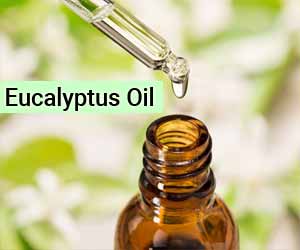- Home
- Editorial
- News
- Practice Guidelines
- Anesthesiology Guidelines
- Cancer Guidelines
- Cardiac Sciences Guidelines
- Critical Care Guidelines
- Dentistry Guidelines
- Dermatology Guidelines
- Diabetes and Endo Guidelines
- Diagnostics Guidelines
- ENT Guidelines
- Featured Practice Guidelines
- Gastroenterology Guidelines
- Geriatrics Guidelines
- Medicine Guidelines
- Nephrology Guidelines
- Neurosciences Guidelines
- Obs and Gynae Guidelines
- Ophthalmology Guidelines
- Orthopaedics Guidelines
- Paediatrics Guidelines
- Psychiatry Guidelines
- Pulmonology Guidelines
- Radiology Guidelines
- Surgery Guidelines
- Urology Guidelines
Indian doctors report rare case of Eucalyptus oil poisoning in adults

Dr Abraham M. Ittyachen at Department of Medicine, M.O.S.C Medical College & Hospital, Kolenchery, Kerala State, India and colleagues have reported two cases of Eucalyptus oil poisoning.The case has appeared in the Journal of Medical Case Reports.
Eucalyptus oil poisoning is rare in adults but is not that uncommon in children. The common side effects in children include depression in the level of consciousness, ataxia, seizures, and vomiting. Unlike in children, seizures are unusual in adult patients with eucalyptus oil poisoning.
According to history a 22-year-old Indian man presented to the ER in a drowsy state at about 9.45 a.m. The patient had been asymptomatic until that morning when he had one episode of seizure. He was accompanied to the ER by his friend. Upon further probing of the patient’s history, the friend of the patient revealed that on the same morning, the patient had taken eucalyptus oil, around 15 ml supposedly for abdominal pain. He had bought it in bottle form, and the bottle had the markings of eucalyptus oil written on it but no information regarding precautions or side effects. When it was revealed to the accompanying friend that eucalyptus oil may have been the cause of the patient’s seizure, he also admitted having consumed the same substance that morning for similar complaints. Soon the accompanying friend also had a bout of seizure while in the ER.
Both the friends were intubated in the ER because of low Glasgow Coma Scale scores and were shifted to the intensive care unit (ICU) for further management. The test results were similar in both patients. Hemograms revealed mild neutrophilic leukocytosis in both patients. The results of renal function and electrolyte panels were normal in both the patients. The patient’s liver enzymes were mildly elevated. The patients' electrocardiograms showed mild tachycardia, and chest radiography was also normal in both patients. Arterial blood gas (ABG) analysis showed the presence of severe metabolic acidosis: patient 1 had a pH of 6.983 (normal range, 7.35–7.45) and HCO3− of 8.3 mmol/L (normal range, 24–28 mmol/L); patient 2 had a pH of 7.042 and HCO3− of 8.7 mmol/L.
Urine samples of both patients were subjected to toxicological analysis, which confirmed the presence of eucalyptus oil. Gas chromatographic analysis of the sample of eucalyptus oil was also performed, which revealed the presence of α-pinene, myrcene, cineole, fenchone, α-terpinolene, camphor, and β-terpinyl acetate.
After orotracheal intubation, both patients underwent gastric lavage. They were managed in the ICU and received standard supportive care. Metabolic acidosis was treated with intravenous bicarbonate infusion, the rate of which was titrated according to the ABG. Both patients also received antiseizure medications.
Metabolic acidosis was corrected in 24–36 hours after admission. Bicarbonate infusion was stopped on the second day. Both the patients were successfully weaned off the ventilator and extubated on the second day of admission. They were discharged 2 days later on a tapering regimen of antiseizure medications. They were subsequently lost to follow-up.
Journal Information: Journal of Medical Case Reports
For more details click on the link: https://doi.org/10.1186/s13256-019-2260-z

Disclaimer: This site is primarily intended for healthcare professionals. Any content/information on this website does not replace the advice of medical and/or health professionals and should not be construed as medical/diagnostic advice/endorsement or prescription. Use of this site is subject to our terms of use, privacy policy, advertisement policy. © 2020 Minerva Medical Treatment Pvt Ltd